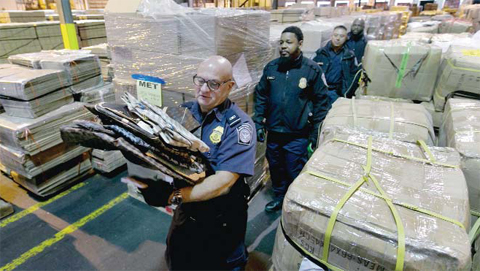 KEARNEY: US Customs and Border Protection officer Jerome Bria, foreground, carries a cache of counterfeit designer bags found in a shipment at H&M Terminals Transport Inc warehouse in Kearney, NJ. Counterfeiting today is a multibillion-dollar business in China, which produces nearly nine of every 10 fake items seized at US borders. —AP
KEARNEY: US Customs and Border Protection officer Jerome Bria, foreground, carries a cache of counterfeit designer bags found in a shipment at H&M Terminals Transport Inc warehouse in Kearney, NJ. Counterfeiting today is a multibillion-dollar business in China, which produces nearly nine of every 10 fake items seized at US borders. —APSHANGHAI: Multinational corporations doing business in China face a losing battle when it comes to keeping copies of their products off the market: The anti-counterfeiting industry they rely on is plagued with fraud, making it that much easier for potentially dangerous fake goods - from air bags to Christmas lights - to reach consumers, an Associated Press investigation has found. Most Western companies subcontract anticounterfeiting work to private investigators paid on commission. More seizures mean higher fees, creating powerful incentives to cheat in an industry with little oversight. As a result, money spent fighting counterfeiting often doesn’t make things better, and sometimes makes them worse.
The AP found instances of investigative fraud involving products that could be hazardous: counterfeit auto parts, pharmaceuticals, personal care products and electrical components. The wrongdoing took many forms: Western firms paid investigators who were themselves manufacturing or selling counterfeit versions of their clients’ own goods. Investigators doctored documents, fabricating raids that never took place. Investigators colluded with factories to make counterfeit goods they could “seize” and present to their Western bosses for payment. As counterfeiting has flourished in China over decades, a lucrative, parallel industry has blossomed to fight it. Counterfeiting today is a multibillion-dollar business in China, which produces nearly nine of every 10 fake items seized at US borders.
Chinese authorities have been getting better at fining counterfeiters and sending them to jail. But the momentum of reform has yet to reach the front lines of the fight against fakes, according to previously undisclosed material from legal cases and internal corporate investigations in China reviewed by the AP, lawsuits, and interviews with 16 private investigators, lawyers and lawenforcement officials.
All described a broken system, beset by endemic and underreported fraud, made worse by Western companies that have a poor command over how to successfully fight fraud. Shanghai’s Public Security Bureau took the unusual step of warning foreign brand owners to be watchful of the investigators they hire. “We very much hope that brand owners will pay attention and devote more manpower and material resources to ensure that the fight against counterfeiting is healthy and orderly,” the bureau said in written response to questions from the AP.
Copycat investigator
One of the world’s largest consumer goods companies hired an investigator to track down counterfeit anti-dandruff shampoo. But instead of finding real counterfeiters, the investigator, Wang Yunming, set up a factory to produce counterfeit shampoo himself, which he then “seized” and billed to the firm as a successful raid, according to two employees involved in the investigation who spoke on condition of anonymity for fear of losing their jobs. It wasn’t the first such factory Wang founded. It was the fourth. Wang was convicted of fraud and is due to be released from prison in 2023, according to a copy of a judgment from Hefei Intermediate People’s Court in China’s Anhui province. Swiss power technology giant ABB Asea Brown Boveri found that one of the investigators it was paying to hunt counterfeiters was herself selling fake ABB circuit breakers. ABB sued the firm she worked for, the China United Intellectual Property Protection Center, which was one of China’s oldest and largest investigations companies. ABB lost its case in Beijing, despite the fact that the investigator, a woman who called herself Flaming Lee, was convicted of selling ABB counterfeits by a court in Dubai, where she lived. — AP










